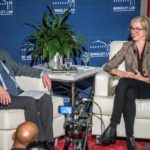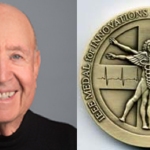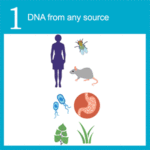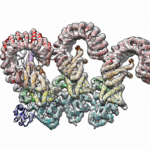The Director’s Distinguished Women in Science Speaker Series at Berkeley Lab kicked off on Monday, November 20, with Jennifer Doudna, a faculty scientist in the Molecular Biophysics & Integrated Bioimaging (MBIB) Division, interviewed by NPR science correspondent Joe Palca. Doudna and Palca began the conversation by highlighting a common connection: They are both graduates of Pomona College in Southern California. From there, they covered a lot of ground, providing a vivid backdrop for the answer to the most pressing question of the day: How did Doudna discover the CRISPR/Cas9 genome editing tool?
Dernburg and Nogales Named Fellows of the American Society for Cell Biology
Biosciences’ Abby Dernburg and Eva Nogales–both of whom are also UC Berkeley professors and HHMI Investigators–have been selected as 2017 Fellows of the American Society for Cell Biology (ASCB). Election as a Fellow is an honor bestowed upon ASCB members by their peers. The award is a lifetime recognition of meritorious efforts to advance cell biology and/or its applications, work in service to the Society, and ongoing loyalty to ASCB.
Budinger to Receive 2018 IEEE Medal for Innovations in Healthcare Technology
Biosciences’ Thomas Budinger has been elected by the IEEE Board of Directors to receive the 2018 IEEE Medal for Innovations in Healthcare Technology for “pioneering contributions to tomographic radiotracer imaging.” An affiliate scientist in the Molecular Biology & Integrated Bioimaging (MBIB) Division and recalled professor in the Department of Bioengineering at UC Berkeley, Budinger noted that the cited work was made possible by support from the DOE and the contributions of his principal colleagues Stephen Derenzo (MBIB), Grant Gullberg (MBIB), Ronald Huesman (emeritus, Life Sciences), and William Jagust (MBIB/UC Berkeley). The award, sponsored by the IEEE Engineering in Medicine and Biology Society, was established in 2009 and is given annually for exceptional contributions to technologies and applications benefitting healthcare, medicine, and the health sciences. A gold medal, bronze replica, certificate, and honorarium will be presented to Budinger at the IEEE Honors Ceremony to be held in conjunction with the Vision, Innovation, and Challenges Summit in the spring.
Dub-seq Wins 2017 R&D100 Award
A high-throughput, cost effective method for discovering gene function in microbes under various environmental conditions is among the winners of R&D Magazine’s 2017 R&D 100 Award. The technology, called Dual Barcoded Shotgun Expression Library Sequencing (Dub-seq), was developed by Adam Arkin, Adam Deutschbauer, Vivek Mutalik, and Pavel Novichkov of the Environmental Genomics and Systems Biology (EGSB) Division. Dub-seq … Read more »
Detailed View of Immune Proteins Could Lead to New Pathogen-Defense Strategies
Berkeley Lab and UC Berkeley biologists used cryo-electron microscopy (cryo-EM) to resolve the structure of a protein complex, called an inflammasome, that is assembled within cells in response to incursion by a pathogen and functions as a beacon to summon immune system support. Inflammasome assembly is initiated when a protein called NAIP5 latches onto a flagellin molecule—a piece of the whiplike tail used by bacteria to propel themselves. Then several copies of another protein, NLRC4, join in to form the ring-shaped protein cluster. The researchers, led by Eva Nogales in Biosciences’ Molecular Biophysics and Integrated Bioimaging (MBIB) Division and Russell Vance in the Department of Molecular & Cell Biology at UCB, found that flagellin is in contact with six different parts of NAIP5. They further demonstrated that the multiple contact sites help prevent bacteria with minor mutations from eluding detection. The study was published in the journal Science. Read more in the Berkeley Lab News Center.
- « Previous Page
- 1
- …
- 135
- 136
- 137
- 138
- 139
- …
- 213
- Next Page »
Was this page useful?








